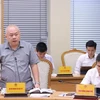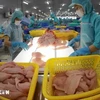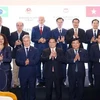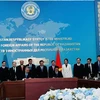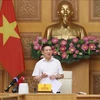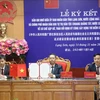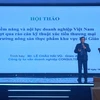Cities and provinces nationwide are set to reserve a significant volume of essential goods and foodstuff worth 2.64 trillion VND (126.5 million USD) to serve consumers during the upcoming Tet (Lunar New Year) Holiday under a price- stabilisation programme.
An official of the Price Management Department under the Ministry of Finance (MoF) said on Nov. 3 that the figure is much higher than that of 950 billion VND (45.5 million USD) spent by cities and provinces over the Tet holiday last year.
According to the department, the programme has so far attracted 244 businesses from 47 cities and provinces to participate. Of this number, 61 companies will use their own capital to run the programme without support from the State.
Under the programme, businesses provide cheaper priced-commodities via two distribution channels. The first channel, accounting for 30 to 40 percent of the total supplies, is aimed at low to mid-income families, while the other focuses on wholesalers, trade centres and supermarkets.
In terms of pricing, businesses involved in the programme will supply commodities at prices 5 to 15 percent lower than those on the market.
These companies will not be allowed to raise prices if the market prices go up. Also, they must reduce their prices by more than 5 percent if the market prices go down.
Deputy director of HCM City 's Department of Industry and Trade (DoIT) Nguyen Van Dong said that his department would provide favourable conditions for businesses to search for goods in other provinces to ensure low and stabilised prices. He also promised to conduct regular supermarket inspections and price stabilisation shops to prevent speculation.
The MoF said that businesses involved in the programme will be allowed to enjoy zero percent interest rates on bank loans. Compared with banks' current high lending interest rates over 20 percent, these companies are indeed given priority.
According to the MoF, HCM City is the leading city involved in these activities and was the first to run the programme in 2002. Meanwhile, several other northern cities and provinces such as Hanoi , Thai Nguyen, and Bac Giang and the Central Highland province Kon Tum started implementing the programme in 2008. /.
An official of the Price Management Department under the Ministry of Finance (MoF) said on Nov. 3 that the figure is much higher than that of 950 billion VND (45.5 million USD) spent by cities and provinces over the Tet holiday last year.
According to the department, the programme has so far attracted 244 businesses from 47 cities and provinces to participate. Of this number, 61 companies will use their own capital to run the programme without support from the State.
Under the programme, businesses provide cheaper priced-commodities via two distribution channels. The first channel, accounting for 30 to 40 percent of the total supplies, is aimed at low to mid-income families, while the other focuses on wholesalers, trade centres and supermarkets.
In terms of pricing, businesses involved in the programme will supply commodities at prices 5 to 15 percent lower than those on the market.
These companies will not be allowed to raise prices if the market prices go up. Also, they must reduce their prices by more than 5 percent if the market prices go down.
Deputy director of HCM City 's Department of Industry and Trade (DoIT) Nguyen Van Dong said that his department would provide favourable conditions for businesses to search for goods in other provinces to ensure low and stabilised prices. He also promised to conduct regular supermarket inspections and price stabilisation shops to prevent speculation.
The MoF said that businesses involved in the programme will be allowed to enjoy zero percent interest rates on bank loans. Compared with banks' current high lending interest rates over 20 percent, these companies are indeed given priority.
According to the MoF, HCM City is the leading city involved in these activities and was the first to run the programme in 2002. Meanwhile, several other northern cities and provinces such as Hanoi , Thai Nguyen, and Bac Giang and the Central Highland province Kon Tum started implementing the programme in 2008. /.

